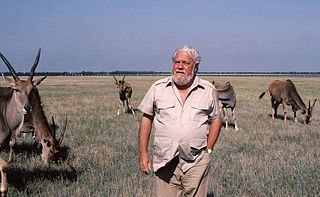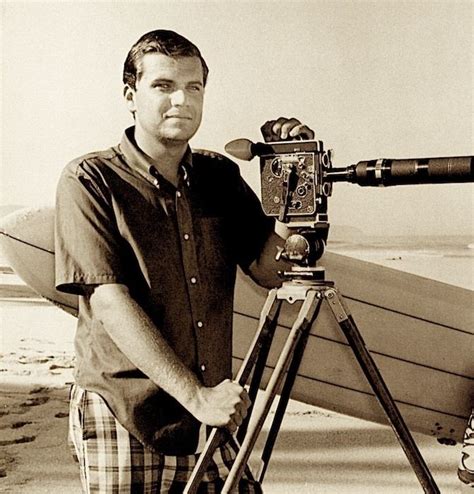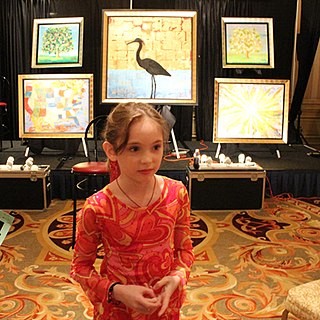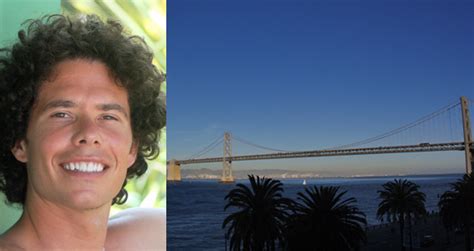Top 195 Humpback Whales Quotes & Sayings - Page 3
Explore popular Humpback Whales quotes.
Last updated on October 11, 2024.
How could I have kept out this incredible fiction? That's when it all started for me. I was, and still am, a HUGE Star Trek fan. "Songs Of The Ocean" is my tribute to this great story, and it's based on the Star Trek IV movie, the one in which they go back in time. [The Voyage Home ; It's the one where they bring a pair of whales to the future -ed.]
Cultures have long heard wisdom in non-human voices: Apollo, god of music, medicine and knowledge, came to Delphi in the form of a dolphin. But dolphins, which fill the oceans with blipping and chirping, and whales, which mew and caw in ultramarine jazz - a true rhapsody in blue - are hunted to the edge of silence.
If I pull in a fish I have no intention of eating, I release him immediately or give it away. If he's swallowed the hook and you know the fish is going to die, rather than leave him to the sharks you should bring him in for the vitamin content. Aquariums welcome fish for feeding the dolphins and whales.
We can learn a great deal from whales. It is the same lesson we can learn from our close genetic relatives, the bonobo apes of the Congo. Here mothers have a great deal of authority, there is very little violence (with no signs of sexual violence against females), and their society is held together by sharing and caring rather than by fear and force.
I'm focusing on quality versus quantity - a nicer tee-shirt with organic cotton and buying just one or two instead of five that are cheaper but made with GMO cotton, which is hard on Earth, sewn by slave labor, shipped all the way from China on boats that use lots of oil and can kill whales with ship strikes and sold by (some) companies that could treat their
Television screens saturated with commercials promote the utopian and childish idea that all problems have fast, simple, and technological solutions. You must banish from your mind the naive but commonplace notion that commercials are about products. They are about products in the same sense that the story of Jonah is about the anatomy of whales.
Every culture from the Egyptians to the Mayans to the American Indians to the Bedouins created bestiaries that enabled them to express their relationship with nature. Ashes and Snow is a 21st-century bestiary filled with species from around the world. Nature’s orchestra includes not just Homo sapiens but elephants, whales, manatees, eagles, cheetahs, orangutans, and many others.
Why keep in touch with them? That's what I want to know,' asked Larry despairingly. 'What satisfaction does it give you? They're all either fossilized or mental.' 'Indeed, they're not mental,' said Mother indignantly. 'Nonsense, Mother... Look at Aunt Bertha, keeping flocks of imaginary cats... and there's Great-Uncle Patrick, who wanders about nude and tells complete strangers how he killed whales with a penknife...They're all bats.
So, too, if, to our surprise, we should meet one of these morons whose remarks are so conspicuous a part of the folklore of the world of the radio--remarks made without using either the tongue or the brain, spouted much like the spoutings of small whales--we should recognize him as below the level of nature but not as below the level of the imagination.
I was very lucky. I was just finishing my PhD at Cambridge in 1981. This opportunity came up because whaling was drawing to an end. There was the prospect of a moratorium, and one of the arguments that was brought up, especially by Japanese whalers, was that, if we didn't have whaling, we would know nothing of whales. All the science depends on having dead animals, they argued, so that's one of the benefits of the whaling industry.
Must whales and dolphins be subjected to deafening noise that will cause more than 3.5 million instances of temporary and/or permanent hearing loss? For species that depend on hearing for survival - to find food, migrate, and communicate - any hearing loss could be catastrophic. As one scientist noted, a deaf whale is a dead whale.
Large factory trawlers indiscriminately scrape and haul up everything from the ocean floor, along with everyone unfortunate enough to get caught in the nets. Roughly one-third of what is dragged in is not profitable fish, but other sea animals, including turtles, whales, dolphins, seals, and seabirds. These beings are referred to by the fishing industry as "by-catch." Severely traumatized and wounded, these animals are subsequently thrown back into the ocean, dead or dying.
. . . and God knows we are sensitive to the suffering that has sometimes broken loose to come billowing forth from your appendages like the pungent vapors of whales - often it appears that in this life of experience and accommodation we pay just as dearly for our triumphs as we do for our defeats. But Sissy . . . hold on!
Eventually man, too, found his way back to the sea. Standing on its shores, he must have looked out upon it with wonder and curiosity, compounded with an unconscious recognition of his lineage. He could not physically re-enter the ocean as the seals and whales had done. But over the centuries, with all the skill and ingenuity and reasoning powers of his mind, he has sought to explore and investigate even its most remote parts, so that he might re-enter it mentally and imaginatively.
When whales die, their bodies sink to the bottom of the ocean and over time become part of the marine sediment layer, where they can sequester the carbon dioxide they have accumulated during their life span, an average of 33 tons for a great whale species, keeping it out of the atmosphere for hundreds or thousands of years.
Not only have I made films about the subject, but I've largely funded them on my own, so I'm fully committed to doing whatever I can to change the audience's respect and appreciation for the ocean. In 100 years I want whales, dolphins and sharks to still be around, and the ocean to be a healthier place.
I don't like to be dismissive of whales speaking possibilities. There is a pretty New Age-y, poorly thought set of ideas about this going around. I also think these animals benefit most from us staying out of their way. I think we learn the most by being as passive as we can, so those are my biases, and I'm sort of against it from that perspective.
But one thing that seems pretty clear when we look at human religion is that it's highly tied in with human culture. So if, as seems to be the case, culture's governing a lot of what whales do, it's perhaps not an unreasonable hypothesis to think that it's got elements of...what I guess you'd call the supernatural.
Right whales, for all their size, are surprisingly athletic. They roll, they slap their flukes, they lift their heads out of the water in a move known as a spy hop. They find playthings and are particularly fond of swimming repeatedly through clumps of seaweed, which slides over them like a feathered boa.
I don't believe there's anything cosmic or divine or morally superior about whales and dolphins or sharks or trees, but I do think that everything that lives is holy and somehow integrated; and on cloudy days I suspect that these extraordinary phenomena, and the hundreds of tiny, modest versions no one hears about, are an ocean, an earth, a Creator, something shaking us by the collar, demanding our attention, our fear, our vigilance, our respect, our help.
I believe that capitalism, at least how it's used by major corporations, and environmental concerns are in opposition. To be ecologically aware, productivity of many things would slow down at least for awhile. Stockholders don't want to hear about the saving of the whales or some stream in Kentucky. They want a return on their investment.
I think training your instinct comes from writing and reading. There's no big secret. And reading slush helps, as well; I'd recommend everyone edit a literary magazine at some point. It's time-consuming, but there's a lot to learn from other writers who are also learning. The patterns (twelve stories about whales in this batch?) are also interesting.
I would like to say, for the record, that I am in favor of using more American Indians and other minorities in motion pictures, I am against polluting the oceans of the world, I am for every nationality having its own homeland, I am against whacking baby seals on the head, and I am for saving the whales.
Brooding, she changed the pool into the sea, and made the minnows into sharks and whales, and cast vast clouds over this tiny world by holding her hand against the sun, and so brought darkness and desolation, like God himself, to millions of ignorant and innocent creatures, and then took her hand away suddenly and let the sun stream down.
We live in an age when you can prowl the streets of major cities and find human beings offering themselves in store windows, or just reach for the yellow pages and have them delivered. It is the same mindset at work, spreading in our world, and after a while this attitude can find nothing very special about anything or anybody, let alone whales.
I walk outside and scream at the top of my lungs, and it maybe travels two blocks. A whale unleashes his cry, and it travels hundreds or even thousands of miles. Every whale in the ocean will at one time or another run into that song. And I figure whales probably don't edit. If they think it, they say it...Whale talk is the truth, and in a very short period of time, if you're a whale, you know exactly what it is to be you.
Most people, when they imagine New England, think about old colonial homes, white houses with black shutters, whales, and sexually morbid WASPs with sensible vehicles and polite political opinions. This is incorrect. If you want to get New England right, just imagine a giant mullet in paint-stained pants and a Red Sox hat being pushed into the back of a cruiser after a bar fight.
While it might surprise many ecologists to hear, capitalism is itself the ultimate form of conservationism. Capitalists seek to conserve resources, not because of sentimental feelings about nature or the earth or whales or worry about the well-being of future generations, but simply because every drop of oil, every ton of ore, every shipment of wood saved is a cost reduction and money in the pocket.
I have never suffered under any delusion that saving the whales in the Antarctic sanctuary would be easy, but the one thing I am certain of is that I and my passionate crew of international volunteers will never quit defending life in the seas from poachers, no matter what consequences we must endure to do so.
Creation is all things and us. It is us in relationship with all things. All things, the ones we see and the ones we do not; the whirling galaxies and the wild suns, the black holes and the microorganisms, the trees and the stars, the fish and the whales - the molten lava and the towering snow-capped mountains, the children we give birth to and their children, and theirs, and theirs, and theirs.
I am entitled to say, if I like, that awareness exists in all the individual creatures on the planet-worms, sea urchins, gnats, whales, subhuman primates, superprimate humans, the lot. I can say this because we do not know what we are talking about: consciousness is so much a total mystery for our own species that we cannot begin to guess about its existence in others.
It's like you said the other day," said Adam. "You grow up readin' about pirates and cowboys and spacemen and stuff, and jus' when you think the world's full of amazin' things, they tell you it's really all dead whales and chopped-down forests and nucular waste hangin' about for millions of years. 'Snot worth growin' up for, if you ask my opinion.
What have we been doing all these centuries but trying to call God back to the mountain, or, failing that, raise a peep out of anything that isn't us? What is the difference between a cathedral and a physics lab? Are not they both saying: Hello? We spy on whales and on interstellar radio objects; we starve ourselves and pray till we're blue.
I can be inspired by anything. It can be from an artist, I love Georgia O'Keefe, de Kooning, Jackson Pollock, Lichtenstein, Koons- I love them all. I can be inspired by an artist, a dream, something that I pass by, I was even inspired by a commercial! A commercial of whale war- I was so sad that people were killing whales to extinction, so I made a painting of that. So I can really be inspired by a lot of things.
This morning I saw a coyote walking through the sagebrush right at the very edge of the ocean ? next stop China. The coyote was acting like he was in New Mexico or Wyoming, except that there were whales passing below. That’s what this country does for you. Come down to Big Sur and let your soul have some room to get outside its marrow.
There is the life of the plankton in almost endless variety; there are the many kinds of fish, both surface and bottom living; there are the hosts of different invertebrate creatures on the sea-floor; and there are those almost grotesque forms of pelagic life in the oceans depths. Then there are the squids and cuttlefish, and the porpoises, dolphins and great whales.
We live in a fantastically wealthy country. We don't have to worry about food. We don't have to worry about clothing. We don't have to worry about our safety. It's very easy for me to be an environmentalist. It's very easy for me to care about making sure that we protect the forests and the whales, and all that stuff.
I guess even the prettiest things eventually end up stinking. Everything does. We all will die and rot and decay and be reborn as dirt or flowers or worms, or polar bears who will drown because their ice is all melting, or presidents of war-torn countries, or whales swimming around acidifying seas. And then we will rot and decay again. And so it goes.
Ten percent of the big fish still remain. There are still some blue whales. There are still some krill in Antarctica. There are a few oysters in Chesapeake Bay. Half the coral reefs are still in pretty good shape, a jeweled belt around the middle of the planet. There's still time, but not a lot, to turn things around.




















































